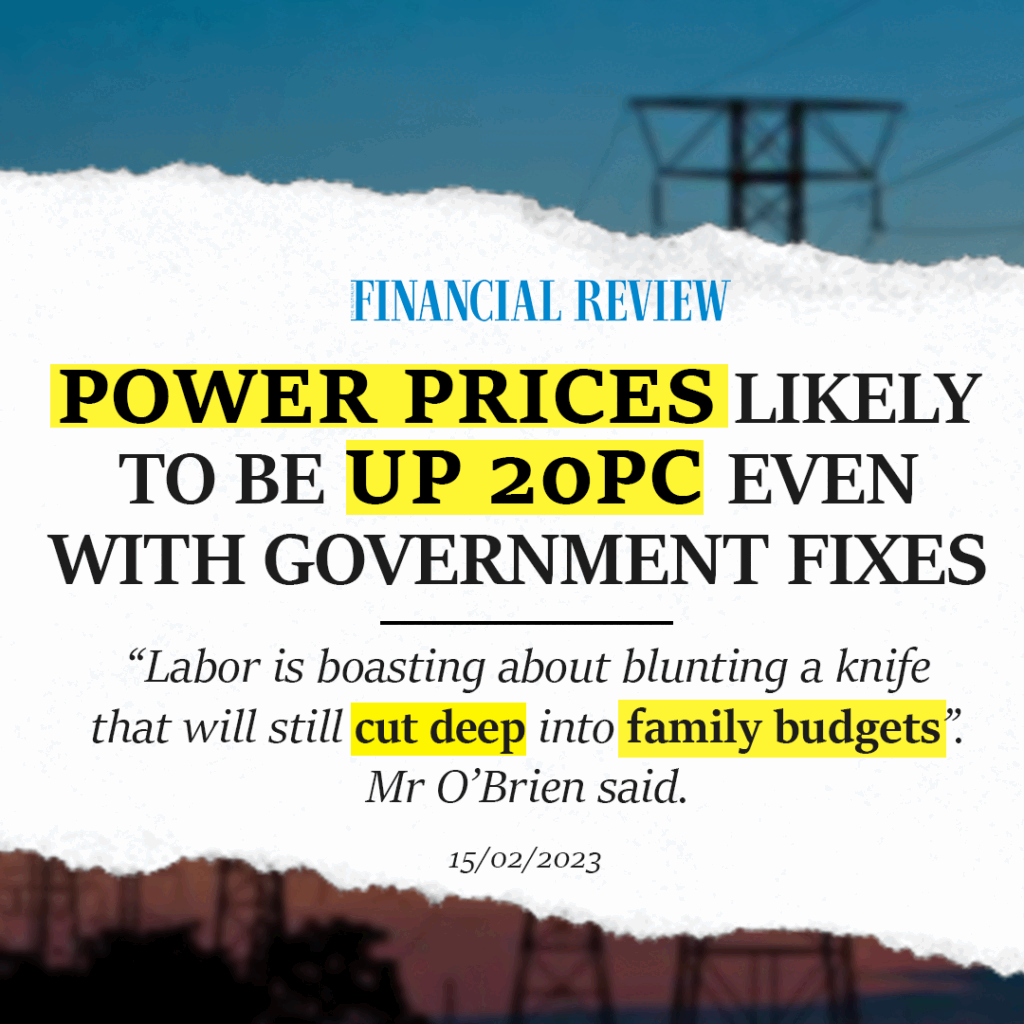Published in the Australian Financial Review, written by Mark Ludlow.
15/02/23
Households and business will probably still be slugged with electricity price increases of up to 20 per cent next financial year, despite the federal government’s price caps on coal and gas.
While Australian Energy Regulator chairwoman Clare Savage on Monday night told budget estimates the government intervention would mitigate price increases, energy experts said there would be double-digit rises from July 1.
Grattan Institute energy program director Tony Wood said federal Treasurer Jim Chalmers has called on companies to pass on the fall in wholesale power prices to consumers, but the reality was more nuanced.
“It’s more of a case to make sure companies don’t pass on too much of the price increases,” Mr Wood told The Australian Financial Review.
“I think you are going to see price increases of 20 per cent – even with the impact of the government intervention – but it will vary between states.”
Dylan McConnell, a senior research associate at UNSW, said while electricity prices increases may not be as bad as previously thought, it was hardly a big “win” for consumers.
“They are less worse than they could have been, but it’s hard to say that’s good news for customers,” Dr McConnell said.
“Forward prices have come down a lot – something like 40 or 50 per cent – but they are still up compared to what they were this time last year.”
Rising power prices have become a major political headache for the Albanese government after both major parties vowed in last year’s election campaign they would reduce power prices.
The ruse was up when the AER released its default market offer days after the May election which showed power prices increases of up to 18 per cent in NSW and 12 per cent in Queensland this financial year.
The anxiety over power prices was exacerbated when the federal budget in October forecast electricity increases of 36 per cent in 2023-24.
But the Albanese government said its energy market intervention had contributed to a 50 per cent fall in wholesale power prices which would flow through to lower retail prices.
Treasury has estimated that electricity prices nationally will rise by 23 per cent in 2023-24, 13 per cent lower than originally forecast. It also estimated the gas price cap will reduce pressure on gas prices, increasing by only 16 per cent next financial year.
State treasurers are also sweating on the details of the $3 billion energy price relief package which will allow respective states to offer rebates to take further pressure off power bills.
Mr Wood said the addition of one-off rebates could help reduce some consumer’s power prices actually falling from July 1, but it would depend on how they were applied.
“But whether the rebate is bigger than the increase we just don’t know,” he said.
The AER said it would announce next year’s default market offer in mid-March, only two months before Dr Chalmers hands down his second budget.
The default market offer, or standing offer, is effectively a safety net for electricity customers who haven’t shopped around for a better deal with energy retailers. It applies in south-east Queensland, NSW and South Australia.
Market offers are usually well-below the default market offer, but a big jump in wholesale power prices, driven by the war in Ukraine, has brought them a lot closer to together.
Opposition energy spokesman Ted O’Brien said Labor’s message on power price rises being lower than what they would have been did not cut it with households.
“This is cold comfort to Australians who are already struggling to pay the highest electricity bills in Australian history,” Mr O’Brien said.
“Labor is boasting about blunting a knife that will still cut deep into family budgets. This is not what they were saying this time last year when they promised to reduce household energy bills by $275.”
One Nation leader Pauline Hanson took to social media to bag Labor’s messaging on power prices.
“Only Labor could try to spin a 23 per cent increase in power prices as a ‘win’,” Senator Hanson tweeted.
